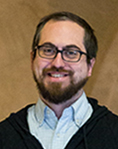Keynote Speakers
Keynote Speakers
Matthew Miller

Matthew Miller from New York Public Library (NYPL) Labs will speak about some of the innovative work NYPL Labs has done to engage the public with their digital holdings. As applications developer, Miller will also discuss the Library Archives & Manuscripts project.
This project is a platform for discovery of the library’s archives and manuscripts collection (over 9,000 collections) and it introduces new approaches to presenting finding aids on the web.
During the keynote, Miller will also discuss another project he is involved in, the Linked Jazz project. “Linked Jazz is an ongoing project investigating the potential of the application of Linked Open Data (LOD) technology to enhance the discovery and visibility of digital cultural heritage materials. The goal of this project is to help uncover meaningful connections between documents and data related to the personal and professional lives of musicians who often practice in rich and diverse social networks.”
In addition, Miller will present a breakout session on the tools created for Linked Jazz.
More About NYPL Labs
From the website: “NYPL Labs is an experimental design and technology team working to re-imagine The Library for the Internet age. Labs developers work closely with librarians and curators to create imaginative tools, apps and experiences around library content and services, often engaging the public directly in the work of improving, organizing or remixing library data.”
Matthew Butler
Matthew Butler, from the University of Iowa’s Digital Research & Publishing department, serves as technical lead for the successful DIY History crowdsourcing transcription project. DIY History is a platform which leverages several open source tools to allow users to transcribe rare cookbooks, manuscripts, diaries, and letters to make them more searchable and useful in the Iowa Digital Library built with CONTENTdm.
Matthew will talk about the journey of making 400 year-old recipes searchable and available to chefs worldwide, creating online tools for scholars to study early pioneer lives, engaging staff and users with archival content, and transforming a small digital library staff into a publisher of open source software. He’ll discuss some of the challenges, goals, and future directions for DIY History as well as valuable lessons learned.
More About DIY History
From the website: “DIY History lets you do it yourself to help make historic documents easier to use. Our digital library holds thousands of pages of handwritten diaries, letters, and other texts — much more than library staff could ever transcribe alone, so we’re appealing to the public to help out. Through “crowdsourcing,” or engaging volunteers to contribute effort toward large-scale goals, these mass quantities of digitized artifacts become searchable, allowing researchers to quickly seek out specific information, and general users to browse and enjoy the materials more easily. Please join us in preserving our past by keeping the historic record accessible — one page at a time.”






